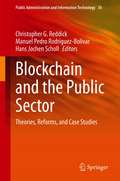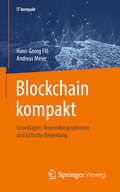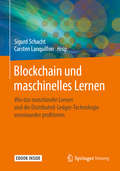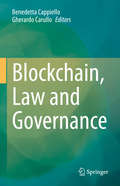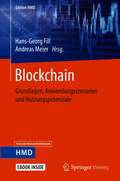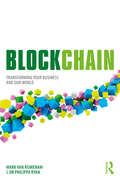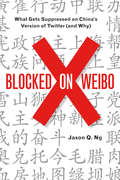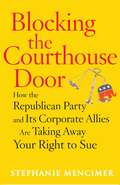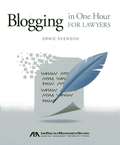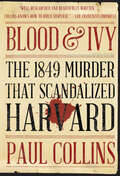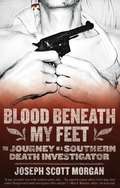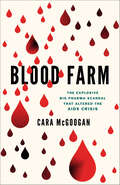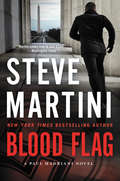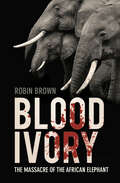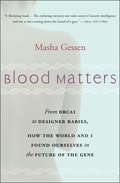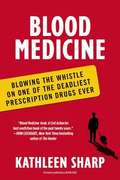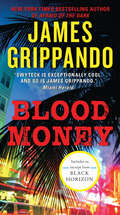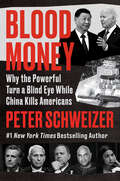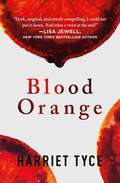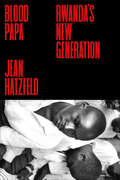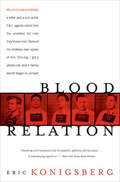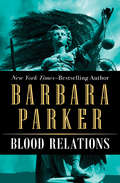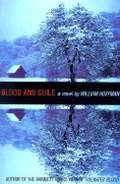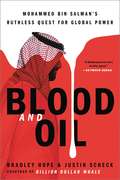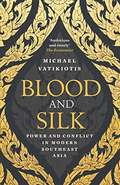- Table View
- List View
Blockchain and the Public Sector: Theories, Reforms, and Case Studies (Public Administration and Information Technology #36)
by Christopher G. Reddick Manuel Pedro Rodríguez-Bolívar Hans Jochen SchollThis book discusses blockchain technology and its potential applications in digital government and the public sector. With its robust infrastructure and append-only record system, blockchain technology is being increasingly employed in the public sector, specifically where trustworthiness and security are of importance. Written by leading scholars and practitioners, this edited volume presents challenges, benefits, regulations, frameworks, taxonomies, and applications of blockchain technology in the public domain.Specifically, the book analyzes the implementation of blockchain technologies in the public sector and the potential reforms it would bring. It discusses emerging technologies and their role in the implementation of blockchain technologies in the public sector. The book details the role of blockchain in the creation of public value in the delivery of public sector services. The book analyzes effects, impacts, and outcomes from the implementation of blockchain technologies in the public sector in select case studies.Providing up-to-date information on important developments regarding blockchain in government around the world, this volume will appeal to academics, researchers, policy-makers, public managers, international organizations, and technical experts looking to understand how blockchain can enhance public service delivery.
Blockchain kompakt: Grundlagen, Anwendungsoptionen und kritische Bewertung (IT kompakt)
by Andreas Meier Hans-Georg FillLernen Sie in diesem Fachbuch mehr über die Grundlagen von BlockchainSie interessieren sich für Kryptowährungen durch Blockchain-Technologie? Aber irgendwie erscheint Ihnen die Thematik wie ein Buch mit sieben Siegeln? Dieses Fachbuch von Hans-Georg Fill und Andreas Meier liefert Ihnen einen Überblick rund um Blockchain. Es erläutert detailliert und übersichtlich die Grundlagen zu folgenden Themenfeldern:Datenstrukturen wie Hash-Funktionen und -BäumeDigitale SignaturFunktionenKonsensalgorithmenetc.Blockchains sind jedoch nicht nur ein Teil von Kryptowährungen. Es handelt sich um ein digitales Buchungssystem. Die Technologie von Ethereum ist daher für viele Unternehmen äußerst interessant (Stichwort Smart Contracts, Smart Grid, Smart Cities). Das Fachbuch über Blockchain ist somit genau das Richtige für Sie, wenn Sie Verbesserungen im eigenen Unternehmen, der Verwaltung oder im öffentlichen Leben vornehmen oder alternative Lösungen angehen wollen.Konzepte und Anwendungen der KryptographieIn den sechs Kapiteln des Fachbuches über Blockchain liefern Ihnen die Autoren Antworten auf verschiedene rechtliche Fragen. Sie befassen sich im Rahmen ihrer Ausführungen kritisch mit der Blockchain-Technologie und zeigen Ihnen wichtige Anwendungsoptionen. Sie erhalten einen fundierten Überblick über folgende Themenfelder:Motivation Betrugsprävention Grundlagen zur Blockchain-Technologie Aufbau und Funktion der BlockchainAnwendungsoptionen Rechtliche FragenKritische EinschätzungDieses Fachbuch über Blockchain richtet sich an Führungsverantwortliche, Projektleiter und Interessierte, die sich einen Überblick über das Potenzial der Blockchain-Technologie verschaffen möchten.
Blockchain und maschinelles Lernen: Wie das maschinelle Lernen und die Distributed-Ledger-Technologie voneinander profitieren
by Sigurd Schacht Carsten LanquillonDurch Bitcoin wurde die Blockchain als zugrundeliegende Technologie bekannt. Sie zählt zu den Distributed-Ledger-Technologien, die zukünftig viele Bereiche des wirtschaftlichen Handels beeinflussen werden. So bergen dezentrale autonome Anwendungen enormes Potenzial, nicht nur Prozesse, sondern auch Vertragsabstimmungen zu automatisieren. Beispielsweise kann ein automatisiertes wirtschaftliches Handeln zwischen Maschinen ermöglicht werden. Um einen derart hohen Automatisierungsgrad zu erreichen, müssen datenbasierte Entscheidungen autonom – ohne menschliches Zutun – getroffen werden. Maschinelle Lernverfahren können dabei eine zentrale Komponente bei der Entscheidungsfindung einnehmen. Das Buch stellt erstmalig die komplementären Themengebiete Distributed-Ledger-Technologie und maschinelles Lernen gegenüber und zeigt auf, welches Potenzial freigesetzt werden kann, wenn beide Technologien zielführend miteinander verbunden werden. Das Buch ist eine unverzichtbare Lektüre für diejenigen, die sich tiefgreifendes Wissen in der Kombination beider Themengebiete aufbauen wollen, indem einerseits die theoretischen Grundlagen und andererseits auch mögliche Anwendungsszenarien dargestellt werden.
Blockchain, Law and Governance
by Benedetta Cappiello Gherardo CarulloThis volume explores from a legal perspective, how blockchain works. Perhaps more than ever before, this new technology requires us to take a multidisciplinary approach. The contributing authors, which include distinguished academics, public officials from important national authorities, and market operators, discuss and demonstrate how this technology can be a driver of innovation and yield positive effects in our societies, legal systems and economic/financial system. In particular, they present critical analyses of the potential benefits and legal risks of distributed ledger technology, while also assessing the opportunities offered by blockchain, and possible modes of regulating it. Accordingly, the discussions chiefly focus on the law and governance of blockchain, and thus on the paradigm shift that this technology can bring about.
Blockchain: Grundlagen, Anwendungsszenarien und Nutzungspotenziale (Edition HMD)
by Andreas Meier Hans-Georg FillSowohl in der Praxis als auch der wissenschaftlichen Forschung ist das Thema "Blockchain" aktuell von großem Interesse. Noch scheint sich die Technologie am Anfang ihrer Entwicklung zu befinden: Plattformen wie Bitcoin, Ethereum, Hyperledger Fabric, Libra, TradeLens oder andere weisen bereits einen beeindruckenden Reifegrad in ihrer technischen Entwicklung auf. Dennoch befinden sich erst wenige von ihnen bzw. darauf aufbauende Applikationen im produktiven Einsatz bei Unternehmen. Hier können nicht nur Forschende optimal dazu beitragen, neue Ideen zu entwickeln, noch nicht betrachtete Anwendungsfälle und -domänen zu untersuchen und erste Prototypen für den konkreten Einsatz zu entwickeln. Die Beiträge der vorliegenden Edition HMD bieten dazu einen umfassenden Überblick und zeigen die große Bandbreite an möglichen Anwendungsfeldern für Blockchains. Das Herausgeberwerk vermittelt somit die Grundlagen zur Blockchain-Technologie, widmet sich den Smart Contracts und beschreibt wichtige Anwendungsszenarien, erste Fallbeispiele und rechtliche Aspekte. Wie typisch für die Fachbuchreihe Edition HMD greifen die Beitragsautoren das Thema aus Sicht von Forschung und Praxis gleichermaßen auf. Ein Glossar mit den wichtigsten Begriffen rundet das Buch ab.
Blockchain: Transforming Your Business and Our World
by Mark Van Rijmenam Philippa RyanThe internet was envisaged as a decentralised global network, but in the past 25 years it has come to be controlled by a few, very powerful, centralised companies. Blockchain is a technological paradigm shift that allows secure, reliable, and direct information transfer between individuals, organisations, and things, so that we can manage, verify, and control the use of our own data. Blockchain also offers a new opportunity for humanity to fix some major problems. It can authenticate data, manage its analysis, and automate its use. With better data comes better decision-making. In this way, Blockchain can contribute to solving climate change, reduce voting fraud, fix our identity systems, improve fair trade, and give the poor an opportunity to improve their lives by monetising their (digital) capital. A world built upon peer-to-peer transactions and smart contracts can empower individuals and communities. This book offers a fresh perspective with which to consider this transformative technology. It describes how Blockchain can optimise the processes that run our society. It provides practical solutions to global problems and offers a roadmap to incorporate Blockchain in your business. It offers a blueprint for a better world. Filled with easy-to-understand examples, this book shows how Blockchain can take over where the internet has fallen short.
Blocked on Weibo
by Jason Q. NgThough often described with foreboding buzzwords such as "The Great Firewall" and the "censorship regime," Internet regulation in China is rarely either obvious or straightforward. This was the inspiration for China specialist Jason Q. Ng to write an innovative computer script that would make it possible to deduce just which terms are suppressed on China's most important social media site, Sina Weibo. The remarkable and groundbreaking result is Blocked on Weibo, which began as a highly praised blog and has been expanded here to list over 150 forbidden keywords, as well as offer possible explanations why the Chinese government would find these terms sensitive.As Ng explains, Weibo (roughly the equivalent of Twitter), with over 500 million registered accounts, censors hundreds of words and phrases, ranging from fairly obvious terms, including "tank" (a reference to the "Tank Man" who stared down the Chinese army in Tiananmen Square) and the names of top government officials (if they can't be found online, they can't be criticized), to deeply obscure references, including "hairy bacon" (a coded insult referring to Mao's embalmed body).With dozens of phrases that could get a Chinese Internet user invited to the local police station "for a cup of tea" (a euphemism for being detained by the authorities), Blocked on Weibo offers an invaluable guide to sensitive topics in modern-day China as well as a fascinating tour of recent Chinese history.
Blocking the Courthouse Door
by Stephanie MencimerThanks to constant political oratory against "frivolous lawsuits" and "jackpot justice," it is widely known that there's a legal crisis in this country. President Bush never misses an opportunity to call for laws that would bring more "common sense" to a legal system that, he claims, is out of control, wrecking the economy, driving doctors out of their practices, bankrupting small businesses, and costing American jobs. Journalists repeat the charges without examining them. As a result, the lawsuit issue has moved to the political front burner, and in the past three years, state after state has responded by limiting citizens' rights to sue. Just this year alone, the Republicanled Congress has passed restrictions on class action lawsuits and is steps away from enacting limits on medical malpractice lawsuits. But is there really a crisis? National data show that the number of civil suits is falling, not rising, and that the average damage award is also going down. Despite intense media hype to the contrary, the number of personal injury lawsuits filed every year has been tumbling for the past decade. Upon closer examination, the stories of ridiculous lawsuits usually turn out to be false or badly misleading. The crisis, in short, appears to be a phantom. So how do we explain the scary headlines? Who's behind the "tort reform movement," and what are the real goals? Blocking the Courthouse Door will show that the movement against so-called greedy trial lawyers and irresponsible plaintiffs is the result of a concerted and successful campaign by large corporations to get this issue on the table and thus limit their own vulnerability in the civil justice system. They have spent decades, and many millions of dollars, on focus groups and Madison Avenue public relations research. They have funded institutes, sponsored academic research, bankrolled politicians, set up phony "astroturf " grassroots organizations (with chamber of commerce return addresses), and fed copy to all-too-gullible journalists. For corporations, the self-interest involved is fairly plain. Tobacco companies, no longer able to dodge the bullet of liability for knowingly selling poisons, are making an end run around the civil justice system. If they can't win a class action suit, they'll make suing itself illegal. Insurance companies, drowning in red ink from mismanagement and bad investments in the bond market, hike insurance rates by huge sums and blame malpractice suits. The doctors in turn blame greedy lawyers -- and their own injured patients. And for Republicans, the campaign provides an extra bonus: defunding the Democratic Party. Limits on lawsuits cut into the income of some of the Democratic Party's most generous donors, the trial lawyers, who are often the only source of campaign cash for Democrats in many states. By exposing some of the dubious characters, corporate chicanery, skewed research, fudged numbers, and bogus journalism that have buttressed the calls for lawsuit reform,Stephanie Mencimer shows who's behind the movement to close the courthouse doors, and how they've successfully persuaded millions of Americans to give up their critical legal rights without fully understanding what they're losing -- often until it's too late.
Blogging in One Hour for Lawyers
by Ernie SevensonUntil a few years ago, only the largest firms could afford to engage an audience of millions. Now, lawyers in any size firm can reach a global audience at little to no cost—all because of blogs. An effective blog can help you promote your practice, become more "findable" online, and take charge of how you are perceived by clients, journalists and anyone who uses the Internet. Blogging in One Hour for Lawyers will show you how to create, maintain, and improve a legal blog—and gain new business opportunities along the way. In just one hour, you will learn to: • Set up a blog quickly and easily • Write blog posts that will attract clients • Choose from various hosting options like Blogger, TypePad, and WordPress • Make your blog friendly to search engines, increasing your ranking • Tweak the design of your blog by adding customized banners and colors • Easily send notice of your blog posts to Facebook and Twitter • Monitor your blog's traffic with Google Analytics and other tools • Avoid ethics problems that may result from having a legal blog
Blood & Ivy: The 1849 Murder That Scandalized Harvard
by Paul Collins“Well-researched and beautifully written.…Collins knows how to build suspense.” —San Francisco Chronicle On November 23rd of 1849, in the heart of Boston, one of the city’s richest men simply vanished. Dr. George Parkman, a Brahmin who owned much of Boston’s West End, was last seen that afternoon visiting his alma mater, Harvard Medical School. Police scoured city tenements and the harbor, and leads put the elusive Dr. Parkman at sea or hiding in Manhattan. But one Harvard janitor held a much darker suspicion: that their ruthless benefactor had never left the Medical School building alive. His shocking discoveries in a chemistry professor’s laboratory engulfed America in one of its most infamous trials: The Commonwealth of Massachusetts v. John White Webster. A baffling case of red herrings, grave robbery, and dismemberment, it became a landmark case in the use of medical forensics and the meaning of reasonable doubt. Paul Collins brings nineteenth-century Boston back to life in vivid detail, weaving together newspaper accounts, letters, journals, court transcripts, and memoirs from this groundbreaking case. Rich in characters and evocative in atmosphere, Blood & Ivy explores the fatal entanglement of new science and old money in one of America’s greatest murder mysteries.
Blood Beneath My Feet
by Joseph Scott MorganHave you ever been locked in a cooler with piles of decomposing humans for so long that you had to shave all the hair off your body in order to get rid of the smell? Joseph Scott Morgan did. Have you ever lit a Marlboro from the ignited gas of a bloated dead man's belly? Joseph Scott Morgan has. Have you ever wept over a dead dog while not giving a shit about the dead owner laying next him? Morgan did. Were you named after a murder victim? Joseph Scott Morgan was. This isn't Hollywood fantasy--it's the true story of a boy born into the deprivations of a white trash trailer park who as an adult gets further involved in the desperate backdoor sagas of the "new South." No hot blondes here, just maggots, grief, and the truth about forensics and death investigation. Joseph Scott Morgan became a death investigator with the Jefferson Parish Coroner's Office in suburban New Orleans in 1987, the youngest medicolegal death investigator in the country. During the day, Morgan worked in the morgue, and at night investigated for the coroner. In 1992 Morgan became senior investigator with the Fulton County Medical Examiner's Office in Atlanta. Morgan is now a college professor at North Georgia College and State University, where he teaches a death investigation course based on the national standards which he helped develop. He and his family reside in the Blue Ridge Mountains of north Georgia.
Blood Farm: The Explosive Big Pharma Scandal That Altered the AIDS Crisis
by Cara McGoogan“A stunning investigation.” —Publishers Weekly How a miracle treatment turned deadly and changed the course of the AIDS crisis. By the mid 1980s, AIDS hysteria was so rampant that a fearful and prejudiced public ignored stories of gay men falling ill with lesions and mouth ulcers. President Reagan avoided mentioning the disease entirely. Then, as chronicled in Blood Farm, a new HIV-positive population emerged, one that included kids like Ken Dixon, Brad Cross, and Ryan White who had been infected as young as ten years old. But how? Unbeknownst to doctors and patients, pharmaceutical companies like Bayer, Baxter, and Armour collected plasma on skid row, in night clubs, and in some of America’s most notorious prisons to make Factor VIII, a new miracle treatment for hemophilia. Companies knew these practices put patients at high risk of HIV, but miracles are a lucrative business, so they knowingly sold an infected product and effectively played Russian Roulette with hemophiliacs’ lives. The results were catastrophic. In America, some 8,000 people with hemophilia contracted HIV; only 700 are alive today. Award-winning journalist Cara McGoogan daringly exposes an expansive map of corporate greed and negligence that led to one of the biggest overlooked medical scandals in history. Alongside her we meet survivors turned activists, determined small town lawyers, and fearless reporters desperate for justice. Their fight for retribution created a critical inflection point in the AIDS crisis: stigmas shifted, settlements were awarded, and, later, President George H.W. Bush signed into law the largest federal program on HIV. In shocking, riveting detail, Blood Farm uncovers how a miracle treatment became a deadly poison and forever changed our understanding of AIDS.
Blood Flag: A Paul Madriani Novel
by Steve MartiniDefending a client accused of killing her father, attorney Paul Madriani is drawn into a treacherous conspiracy dating to World War II in this enthralling installment in the New York Times bestselling series.Paul Madriani and Harry Hinds have a new client: Emma Brauer, a woman accused in the "mercy killing" of her aged father, Robert Brauer. Insisting she's innocent, Emma tells Paul about a package sent to her father shortly before he entered the hospital. Bequeathed to him by a member of his unit from World War II, the box contains a key and a slip of paper. Emma fears that this package is connected to her father's death.When Paul's young assistant Sofia is murdered, Madriani is blindsided by the realization that Emma's fears are well-grounded.Digging into Robert's military history, Madriani discovers that other members of the Army unit Robert served with have recently died--under similarly suspicious circumstances. When he finds that the box sent to Brauer relates to a mysterious talisman that went missing at the end of the war--a feared Nazi relic known as the "Blood Flag"--Madriani and Hinds realize they are in for the fight of their lives.With Emma's life on the line and their own safety in jeopardy, Madriani must uncover the truth before the evil of the Blood Flag is allowed to spin a new web.
Blood Ivory: The Massacre of the African Elephant
by Robin Brown‘masterly account of the massacre of the African elephant’- The SpectatorIt is more than a thousand years since the exploitation of the elephant began, when they were most commonly used as war elephants. However, it is only in the last hundred years, with the coming of the ‘great white hunters’ and their special elephant guns, that the very existence of the African elephant has been threatened.?With an update by John Hanks, WWF’s former leading elephant scientist, this new edition of Blood Ivory tells the story of how the professional hunting fraternity was the first to realise the threat to the elephant and how it kick-started the whole conservation movement. It is not a story with a happy ending, however. It is a tale of war: colonialists against traditional practices and customs; newly independent African countries against each other; poachers and smugglers against any kind of constraint.Robin Brown draws on his depth of knowledge and understanding of Africa and his career as a leading wildlife film-maker to paint a vivid picture of hunting’s impact on Africa’s elephant population, vividly portraying the powerful personalities of those involved on both sides of the massacre.
Blood Matters: From BRCA1 to Designer Babies, How the World and I Found Ourselves in the Future of the Gene
by Masha GessenA National Book Award winner&’s personal journey through the ethical dilemmas and unsettling choices raised by the new frontier of DNA testing. Several years after Masha Gessen&’s mother died of breast cancer, she discovered she too had the BRCA1 gene mutation, which predisposes women to high rates of ovarian and breast cancer. Her doctors gave her narrow options: surgical removal of her breasts and ovaries or living with the likelihood of one day developing cancer. As Gessen wrestled with her own health decisions, she sought more information about the implications of genetic testing from a variety of sources—ranging from others faced with her same dilemma to medical researchers, historians, and religious thinkers. With concerns both practical and philosophical, personal and societal, her inquiry led her across the globe, with stops in Israel, Russia, Austria, and the United States. Weaving her own story into her journalistic research, Gessen offers insight into how knowledge that was once unimaginable now shapes our lives. Blood Matters explores not only the decisions we must make in our physical and emotional health, but also the ethical choices we face when choosing spouses or having children. &“Valuable reading to almost anyone facing a huge health decision, not only for the literary commiseration it offers, but also for the inspired example of medical sleuthing on one&’s own behalf that it provides. Gessen keeps an inflammatory topic at room temperature, writing elegantly and without self pity.&” —The New York Times Book Review
Blood Medicine
by Kathleen Sharp“Blood Feud rivals A Civil Action for best non-fiction book of the past twenty years. ” — John Lescroart, New York Times bestselling author of Damage Procrit seemed like a biotech miracle, promising a golden age in medical care. Developed in the 1980s by Amgen and licensed to the pharmaceutical giant, Johnson & Johnson, the drug (AKA Epogen and Aranesp) soon generated billions in annual revenue—and still does. In 2012, world famous cyclist, Olympian, and Tour de France champion Lance Armstrong was banned from professional cycling on doping charges for using EPO (the blanket name for the drugs Procrit and Epogen), resulting in a global controversy about abuse, big pharmaceutical companies, and the lies and inaccuracies concerning performance-enhancing drugs. Mark Duxbury was a J&J salesman who once believed in the blood-booster, setting record sales and winning company awards. Then Duxbury started to learn unsavory truths about Procrit and J&J’s business practices. He was fired and filed a whistleblower suit to warn the public. When Jan Schlichtman (A Civil Action) learned of Duxbury’s crusade, he signed on. Now, he’s fighting on behalf of cancer patients and for every American who trusts Big Pharma with his life. .
Blood Money (Jack Swyteck #10)
by James Grippando<P>New York Times bestselling author James Grippando delivers a powerful, nonstop thrill ride ripped from the headlines. <P>Miami criminal defense attorney Jack Swyteck is back in his most frightening case yet, and this time the price of victory is measured in blood. It is the most sensational murder trial since O. J. Simpson's. The nation is obsessed with Sydney Bennett, a sexy nightclub waitress and good-time girl accused of murdering her two-year-old daughter for cramping her party life. When he had agreed to defend Sydney, Jack Swyteck knew he'd be taking on the toughest and most controversial case of his career. <P>Millions of "TV jurors" have convicted Sydney in the court of public opinion. When the shocking verdict of not guilty is announced, citizens across the country are outraged, and Jack is bombarded by the fallout: angry, profanity-laced phone calls and even outright threats. Media-fed rumors of "blood money"-purported seven-figure book and movie deals-ratchet up the hysteria, putting Jack's client and everyone around her at risk. <P>On the night of Sydney's release, an angry mob outside the jail has gathered to serve its own justice. In the frenzy, an innocent young woman bearing a striking resemblance to the reviled Sydney Bennett ends up in a coma. While the media blame Jack and his defense team, the victim's parents reach out to him, requesting his help. <P>They don't believe the attack was the tragic result of random mob violence. Searching for the truth about what happened that night, Jack makes a frightening discovery. Larger and much more powerful forces are working in the shadows, and what happened outside the jail is a symptom of an evil that infected the show-stopping trial and media-spun phenomenon of Sydney Bennett.
Blood Money: Why the Powerful Turn a Blind Eye While China Kills Americans
by Peter SchweizerAN INSTANT #1 NEW YORK TIMES BESTSELLERIt’s often said that China is in a cold war with America. The reality is far worse: the war is hot, and the body count is one-sided.China is killing Americans and working aggressively to maximize the carnage while our leaders remain passive and, in some cases, compliant. Why?If anyone could crack the code, it’s the renowned nonpartisan investigator Peter Schweizer. Schweizer’s previous three number one New York Times bestsellers sent shock waves through official Washington, sparking FBI investigations and congressional probes that continue to this day.For Blood Money, Schweizer and his team of forensic investigators spent more than two years scouring a trove of restricted Chinese military documents, data-mining a mountain of American financial records, and tracking US political leaders’ investments and family businesses. Schweizer unloads bombshell after bombshell, exposing the Chinese Communist Party’s covert operations in the American drug trade, social justice movement, and medical establishment to sow chaos and decadence in the United States.A towering achievement of investigative journalism, Blood Money is one of those rare books that makes you clearly see the world anew.
Blood Orange
by Harriet TyceA young lawyer's outwardly perfect life spirals out of control as she takes on her first murder case in this dark and twisty debut thriller for readers of Paula Hawkins, A.J. Finn, or Shari Lapena.Alison has it all. A doting husband, adorable daughter, and a career on the rise--she's just been given her first murder case to defend. But all is never as it seems... Just one more night. Then I'll end it. Alison drinks too much. She's neglecting her family. And she's having an affair with a colleague whose taste for pushing boundaries may be more than she can handle.I did it. I killed him. I should be locked up. Alison's client doesn't deny that she stabbed her husband - she wants to plead guilty. And yet something about her story is deeply amiss. Saving this woman may be the first step to Alison saving herself.I'm watching you. I know what you're doing.But someone knows Alison's secrets. Someone who wants to make her pay for what she's done, and who won't stop until she's lost everything....
Blood Papa: Rwanda's New Generation
by Jean HatzfeldThe continuation of a groundbreaking study of the Rwandan genocide, and the story of the survivor generationIn Rwanda from April to June 1994, 800,000 Tutsis were slaughtered by their Hutu neighbors in the largest and swiftest genocide since World War II. In his previous books, Jean Hatzfeld has documented the lives of the killers and victims, but after twenty years he has found that the enormity of understanding doesn’t stop with one generation. In Blood Papa, Hatzfeld returns to the hills and marshes of Nyamata to ask what has become of the children—those who never saw the machetes yet have grown up in the shadow of tragedy.Fabrice, Sandra, Jean-Pierre, and others share the genocide as a common inheritance. Some have known only their parents’ silence and lies, enduring the harassment of classmates or the stigma of a father jailed for unspeakable crimes. Others have enjoyed a loving home and the sympathies offered to survivor children, but do so without parents or an extended family. The young Rwandans in Blood Papa see each other in the neighborhood—they dance and gossip, frequent the same cafés, and, like teenagers everywhere, love sports, music, and fashion; they surf the Web and dream of marriage. Yet Hutu and Tutsi children rarely speak of the ghosts that haunt their lives. Here their moving first-person accounts combined with Hatzfeld’s arresting chronicles of everyday life form a testament to survival in a country devastated by the terrible crimes and trauma of the past.
Blood Relation
by Eric KonigsbergA New Yorker writer investigates the life and career of his hit-man great-uncle and the impact on his family.Growing up in a household as generic as Midwestern Jews get, author Eric Konigsberg always wished there was something different about his family, something exotic and mysterious, even shocking. When he was sent off to boarding school, he learned from an ex-cop security guard that there was: His great-uncle Harold, in prison in upstate New York, was a legendary Mafia enforcer, suspected by the FBI of upwards of twenty murders.Konigsberg had uncovered a shameful, long-hidden family secret. His grandfather, a Jewish Horatio Alger story who had become a respected merchant through honesty and hard work, never spoke of his baby brother. When other relatives could be coaxed into talking about him, he wasn't "Kayo" Konigsberg, the "smartest hit man" and "toughest Jew" described by cops and associates; he was Uncle Heshy, the loudmouth nogoodnik and smalltime con, long since written off as dead. Intrigued, Konigsberg ignored his family's protests and arranged a meeting, which inspired the acclaimed New Yorker piece this book is based on.In Blood Relation, Konigsberg portrays Harold as a fascinating, paradoxical character: both brutal and winning, a cold-blooded killer and a larger-than-life charmer who taught himself to read as an adult and served as his own lawyer in two major trials, to riotous effect. Functioning by turns as Kayo's pursuer, jailhouse scribe, pawn, and antagonist, Konigsberg traces his great-uncle's checkered and outlandish life and investigates his impact on his family and others who crossed his path, weaving together strands of family, Jewish identity, justice, and post-war American history.
Blood Relations
by Barbara ParkerFrom New York Times-bestselling author and former Miami prosecutor Barbara Parker comes a spellbinding legal thriller about a sexual attack at a South Beach nightclub that has shocking repercussions for the victim, the three suspects, and an idealistic prosecutor Sam Hagen's eighteen years as a prosecutor haven't inured him to violence, even in Miami, where murder has become almost routine. Now a seventeen-year-old model named Ali D. claims she was gang-raped in the VIP room of a South Beach nightclub. Trouble is, two of the men she's accusing are Miami movers and shakers: Marquis Lamont, pro-footballer turned actor, and connected Italian businessman Klaus Ruffini, who owns a high-profile property in South Beach. Under political pressure from the state's attorney, Hagen is expected to dismiss the case for lack of evidence. At home, his marriage is crumbling and he finds his moral certitude tested when he rekindles an affair with model-turned-photographer Caitlin Dorn. Now Hagen's about to make more enemies: He decides to pursue the rape investigation, which soon erupts in murder. Caught up in a maelstrom of violence and suspicion, this seasoned prosecutor must race to solve an out-of-control case.
Blood and Guile
by William Hoffman[From the front flap:] "From the award-winning author of Tidewater Blood comes a story of lifelong friendships, valor, and betrayal that unfolds with deadly calm. It begins on a hunting trip in the mountains of West Virginia. Walter, Drake, and Cliff have known one another for a lifetime. Blood brothers who have gone their separate ways over the years, they have gathered together again for a weekend of conviviality and the chance to shoot ruffed grouse. During the first morning in the woods, they are confronted with a tragedy. The fourth member of the hunting group--an invited newcomer--is shot and killed by Cliff. This seemingly accidental death is a problem for the local sheriff, and Cliff is called back to the mountains. His story doesn't fit the facts. Determined to help him, and standing in as Cliff's lawyer, Walter finds himself drawn into the investigation, even as he struggles to comprehend the changes in his friends. As the authorities build their case, Walter can no longer deny that all is not what it seems, and his trust in his friends slowly erodes. They have secrets they will not share--secrets that will ultimately tear their friendships apart and set them on a course to disaster. Evocative and suspenseful, Blood and Guile builds with a subtle force to expose the deepest desires buried in the hearts of men."
Blood and Oil: Mohammed bin Salman's Ruthless Quest for Global Power
by Bradley Hope Justin Scheck**Longlisted for the Financial Times & McKinsey Business Book of the Year Award**From award-winning Wall Street Journal reporters Justin Scheck and Bradley Hope (coauthor of Billion Dollar Whale), this revelatory look at the world's most powerful ruling family reveals how a rift within Saudi Arabian royalty produced Crown Prince Mohammed bin Salman, a charismatic leader with a ruthless streak.Thirty-five-year-old Mohammed bin Salman's sudden rise stunned the world. Political and business leaders such as former UK prime minister Tony Blair and WME chairman Ari Emanuel flew out to meet with the crown prince and came away convinced that his desire to reform the kingdom was sincere. He spoke passionately about bringing women into the workforce and toning down Saudi Arabia's restrictive Islamic law. He lifted the ban on women driving and explored investments in Silicon Valley.But MBS began to betray an erratic interior beneath the polish laid on by scores of consultants and public relations experts like McKinsey & Company. The allegations of his extreme brutality and excess began to slip out, including that he ordered the assassination of Washington Post journalist Jamal Khashoggi. While stamping out dissent by holding three hundred people, including prominent members of the Saudi royal family, in the Ritz-Carlton hotel and elsewhere for months, he continued to exhibit his extreme wealth, including buying a $70 million chateau in Europe and one of the world's most expensive yachts. It seemed that he did not understand nor care about how the outside world would react to his displays of autocratic muscle-what mattered was the flex.Blood and Oil is a gripping work of investigative journalism about one of the world's most decisive and dangerous new leaders. Hope and Scheck show how MBS's precipitous rise coincided with the fraying of the simple bargain that had been at the head of U.S.-Saudi relations for more than eighty years: oil in exchange for military protection. Caught in his net are well-known US bankers, Hollywood figures, and politicians, all eager to help the charming and crafty crown prince.The Middle East is already a volatile region. Add to the mix an ambitious prince with extraordinary powers, hunger for lucre, a tight relationship with the White House through President Trump's son in law Jared Kushner, and an apparent willingness to break anything -- and anyone -- that gets in the way of his vision, and the stakes of his rise are bracing. If his bid fails, Saudi Arabia has the potential to become an unstable failed state and a magnet for Islamic extremists. And if his bid to transform his country succeeds, even in part, it will have reverberations around the world.
Blood and Silk: Power and Conflict in Modern Southeast Asia
by Michael VatikiotisWhy are Southeast Asia's richest countries such as Malaysia riddled with corruption? Why do Myanmar, Thailand and the Philippines harbour unresolved violent insurgencies? How do deepening religious divisions in Indonesia and Malaysia, and China's growing influence, affect the region and the rest of the world? Thought-provoking and eye-opening, Blood and Silk is an accessible, personal look at modern Southeast Asia, written by one of the region's most experienced outside observers. This is a first-hand account of what it's like to sit at the table with deadly Thai Muslim insurgents, mediate between warring clans in the Southern Philippines and console the victims of political violence in Indonesia - all in an effort to negotiate peace, and understand the reasons behind endemic violence.
